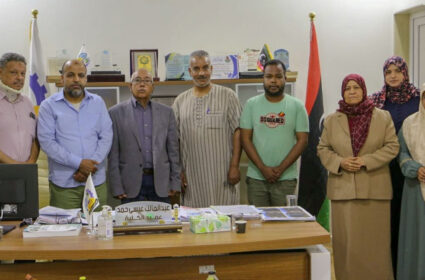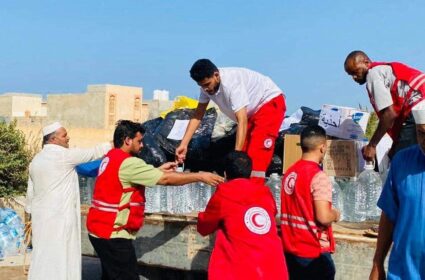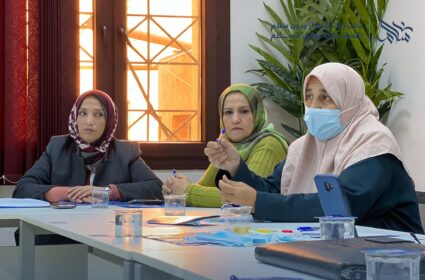Social Peace Partnerships bring together a diverse group of local people, with a shared vision of Libya becoming a safe and inclusive country.
Members of a Social Peace Partnership include senior representatives from the local authority and leaders from civil society, community/elders, business, individuals/groups responsible for providing security, local radio, social media influencers and local residents.
Social Peace Partnerships are supported by a team of Libyan trainer mentors who have the capacity to train others and support Social Peace Partnership development. This arrangement facilitates a range of programming in Libya.
A Social Peace Partnership brings leaders in the community together to build a structure around the local authority – establishing inclusive participatory local decision-making processes that support a relationship between citizens and the local authority, helping to build trust and legitimacy.
Social Peace Partnerships also engage with different community groups, helping to bolster relationships and strengthen the social fabric of the community. Conflict sensitivity is embedded as a principle into Social Peace Partnerships, so that the community can gain understanding of how actions may have unintended impacts on peace and conflict. Their functions include:
- understanding the historic and current drivers of community conflict and engaging in dialogue
- analysing local conflicts, with a specific focus on analysing community tensions and responding before tensions escalate into violence
- building local action plans that identify the development needs and aspirations of local residents – and which, through that process, nurture community relationships – focusing on activities known as social peace actions that work across different identity groups
- developing a communication plan that conveys positive messages of community cooperation to a wide range of audiences and that challenge the prevailing conflict and/or divisive narratives
- establishing relationships and structures that support a robust crisis management mechanism, and promoting the adoption of new habits for addressing conflict through dialogue, collaboration and inclusion that include marginalised groups such as women and youth
Over the last six years there has been significant growth in the number of Social Peace Partnerships in Libya, expanding to 40 towns and cities (highlighted in this map): 14 established by the PCi programme; 15 self-generated or established ad hoc with limited PCi support; and 11 established through a small grant scheme.

Innovation
Social Peace Partnerships have demonstrated that they can forge strong relationships of trust with local authorities, civil society, businesses and residents – but they are especially unique because of their versatility, acting as a resource for communities to meet different kinds of challenges in Libya. For example, Social Peace Partnerships provided leadership to act fast against COVID-19, with some using the networking power of social media to distribute information on how best to prevent and mitigate the spread of the virus. They also worked to change local narratives to avoid stigmatising certain groups as being the carriers of COVID-19. The basic Social Peace Partnership structure has also been used to engage with different types of programming, such as the UNDP Local Governance Project, which support local authorities to build capacity.
Impact
- Mediate complex conflict in local communities, despite the polarised environment; for example, a female member of the Ubari Social Peace Partnership mediated a complex conflict between the Tebu and Arab communities, preventing an escalation of violence
- Include marginalised voices (such as women and youth) in community decision-making processes through skills training and economic empowerment. In March 2020, a three-day youth forum in Zuwara brought together over 95 young activists from 27 towns/cities
- Build connectivity between towns that have become isolated through conflict divides and support a new narrative – that Libya is one country – through a “twinning” methodology, in which more experienced Social Peace Partnerships support less experienced Social Peace Partnerships
To view the SPLD Brochure, click here.
What is social peace?
Social peace is achieved when people have a strong two-way relationship with the state and other community groups, and they trust that decisions by the state are made fairly, even if they do not benefit from them directly.
Social peace does not entail removing differences in society or gaining consensus between all groups; rather, it means better management of conflicting interests and needs, so that people do not feel they have to resort to violence in order to protect their rights.
Social peace translated into action
In January 2020, representatives from the Tripoli Social Peace Partnership, Municipal Council and the Basketball Association worked together – supported by the more experienced Nalut Social Peace Partnership – to improve the physical environment in central Tripoli. This involved the rehabilitation of a local basketball ground and a children’s playground by youth, which all citizens could enjoy. When the rehabilitation was complete a charitable basketball game took place between the Tripoli and Nalut Social Peace Partnerships.

Latest News

Advocating for women’s inclusion in higher education in Jakharra
The Jakharra Social Peace Partnership is advocating for greater women’s inclusion in higher education, despite restrictive social and gender norms towards the role of women.

How Social Peace Partnerships responded to the Storm Daniel emergency
In the aftermath of Storm Daniel, Social Peace Partnerships across Libya quickly mobilised to respond to the unprecedented emergency in eastern Libya.

Building a more inclusive peace: women’s inclusion and leadership
A key part of our work in Libya focuses supporting women’s inclusion in peacebuilding efforts, ensuring women’s perspectives and needs are better reflected in decision-making, and understanding how different gendered experiences of conflict impact peacebuilding.
